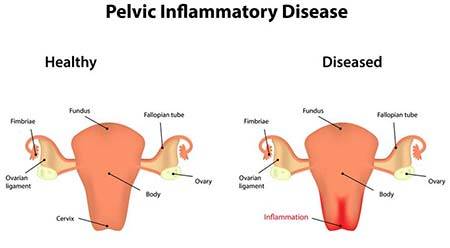Treat Pelvic inflammatory disease (PID). It an infection of one or more of the upper reproductive organs, including the uterus, fallopian tubes and ovaries. Untreated PID can cause scar tissue and pockets of infected fluid (abscesses) to develop in the reproductive tract, which can cause permanent damage Pelvic inflammatory disease (PID) is an infection of the female reproductive organs. It most often occurs when sexually transmitted bacteria spread from your vagina to your uterus, fallopian tubes or ovaries. The signs and symptoms of pelvic inflammatory disease can be subtle or mild. Some women don’t experience any signs or symptoms. As a result, you might not realize you have it until you have trouble getting pregnant or you develop chronic pelvic pain.
Symptoms
The signs and symptoms of the pelvic inflammatory disease might be mild and difficult to recognize. Some women don’t have any signs or symptoms. When signs and symptoms of PID are present, they most often include:
- Pain — ranging from mild to severe — in your lower abdomen and pelvis
- Abnormal or heavy vaginal discharge that may have an unpleasant odor
- Abnormal uterine bleeding, especially during or after intercourse, or between menstrual cycles
- Pain during intercourse
- Fever, sometimes with chills
- Painful, frequent or difficult urination
Causes
PID is caused by sexually transmitted diseases (STDs). Common causes include chlamydia and gonorrhea. Chlamydia is a common cause of silent PID, which means many women do not know they are infected.
To clarify, If you have an undiagnosed STD, your risk of PID is higher any time the cervix is open and infection can potentially enter the uterus. So You have a higher risk of PID after childbirth, miscarriage, abortion, endometrial biopsy, IUD insertion, HSG and hysteroscopy, and artificial insemination.
While pelvic infection can be caused by bacteria besides STDs, this is rarely called PID. The symptoms and treatment, however, may be similar.

Complications
Untreated pelvic inflammatory disease might cause scar tissue and pockets of infected fluid (abscesses) to develop in the reproductive tract. These can cause permanent damage to the reproductive organs. Complications from this damage might include:
- Ectopic pregnancy. PID is a major cause of tubal (ectopic) pregnancy. An ectopic pregnancy can occur when untreated PID has caused scar tissue to develop in the fallopian tubes. The scar tissue prevents the fertilized egg from making its way through the fallopian tube to implant in the uterus. Instead, the egg implants in the fallopian tube. Ectopic pregnancies can cause massive, life-threatening bleeding and require emergency medical attention.
- Infertility. Damage to your reproductive organs may cause infertility — the inability to become pregnant. The more times you’ve had PID, the greater your risk of infertility. Delaying treatment for PID also dramatically increases your risk of infertility.
- Chronic pelvic pain. Pelvic inflammatory disease can cause pelvic pain that might last for months or years. Scarring in your fallopian tubes and other pelvic organs can cause pain during intercourse and ovulation.
- Tubo-ovarian abscess. PID might cause an abscess — a collection of pus — to form in your reproductive tract. Most commonly, abscesses affect the fallopian tubes and ovaries, but they can also develop in the uterus or in other pelvic organs. If an abscess is left untreated, you could develop a life-threatening infection.









